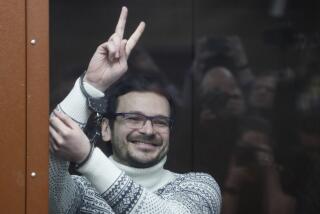Yeltsin Names Defender of Press Freedoms to Broadcasting Post
- Share via
MOSCOW — In a long-awaited appointment, Russian President Boris N. Yeltsin gave Commonwealth-wide broadcasting a new chief Monday, selecting Vyacheslav I. Bragin, a legislator who has defended press freedoms but also has proven to be a Yeltsin loyalist.
Yegor Yakovlev, the former head of the Ostankino radio and television company, was fired by Yeltsin two months ago, accused of, among other things, unfairly covering ethnic conflict in southern Russia. Because the owlish, respected Yakovlev was at the forefront of the push for greater Soviet press freedoms that began in the mid-1980s, his removal ignited worries about a possible restoration of state controls on expression.
By naming Bragin, 53, Yakovlev’s successor as chairman of the Supreme Soviet’s Committee on Mass Media, Yeltsin should do much to calm the fears of Russian liberals and journalists, while also appealing to a goodly number of Bragin’s colleagues in Russia’s fractious Parliament.
“I think our major responsibility is honest and free information for our citizens,” the bespectacled Bragin assured Ostankino’s viewers in an interview aired on the television channel’s 9 p.m. news broadcast.
Bragin takes command of the remnants of Soviet Central Television and Radio, one of the most powerful forces still binding Russia and its former sister republics together and a key institution if a truly popular allegiance to the Commonwealth of Independent States is to be forged.
But when compared with the Russian government’s own channel, Ostankino’s newscasts often seem cautious and insipid. Because of its Commonwealth-wide mandate, the channel, largely financed by Russia, uses local reports from other former Soviet republics--even when they blatantly toady to authorities there.
More objective journalism has proven dangerous. When Yakovlev in November allowed the showing of a film about the plight of the Ingush people caught up in a war in the Russian region of North Ossetia, that territory’s president objected and Yakovlev was dismissed.
Bragin, who quit the Communist Party after the Soviet army massacred unarmed Lithuanian protesters in January, 1991, also has his critics. During last month’s session of the Congress of People’s Deputies, Parliament Chairman Ruslan I. Khasbulatov repeatedly called for dissolving Bragin’s legislative committee, which is seen by Communists and conservatives as little more than a shill for Yeltsin’s government.
Bragin had crossed Khasbulatov earlier in the year by fighting for the independence of the respected evening newspaper Izvestia, which Khasbulatov’s Supreme Soviet unsuccessfully claimed as the legislature’s own organ.
More to Read
Sign up for Essential California
The most important California stories and recommendations in your inbox every morning.
You may occasionally receive promotional content from the Los Angeles Times.













